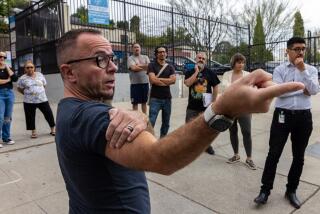Success of ‘Little India’ Puts Parking at a Premium, Merchants Say : Artesia: About 90 businesses catering to East Indians have rejuvenated four blocks of Pioneer Boulevard.
- Share via
Ron Miller has been filling prescriptions for a myriad of ailments at the Artesia Pharmacy on Pioneer Boulevard for 15 years.
But there’s one problem for which the popular pharmacist does not have a cure: parking.
Every weekend, crowds of shoppers descend on Pioneer between 183rd and 187th streets to visit “Little India,” a cluster of stores and restaurants where East Indian emigres can find food, spices, clothing and other familiar items.
Merchants acknowledge that the Indian businesses, which constitute 80% of the retail shops along the four-block stretch, have rejuvenated a decaying retail district.
But they complain that the area has become so jammed from Thursday afternoon to Sunday evening that frustrated drivers zoom around corners and commit other traffic sins jockeying for elusive parking spaces. Some customers just stay away.
“It’s just frustrating when my customers come in and say, ‘I had to circle around the store several times to find a space,’ ” Miller said. “They are sick when they come in here. They want to get their prescription and go home.”
Miller, who has a nine-space parking lot, employs a security guard on Saturdays to limit parking to pharmacy customers.
The parking hassles have led to a 20% drop in business at Martell’s Cleaners near 186th, said owner Glenn Seade. “These were good customers who plainly came up to us and said, ‘We cannot fight the parking,’ ” he said.
Retailers say the city has granted too many permits to businesses in the area without requiring them to provide adequate on-site parking.
Several retailers submitted a petition with about 300 signatures to City Hall last year demanding that something be done about parking. The City Council has asked its staff to study the issue.
But City Manager Paul J. Philips said he believes the retailers are exaggerating the area’s parking problems. He pointed out that several shopping centers have large lots, adding that the parking is most limited along a block of Pioneer between 186th and 187th streets.
He said the city approved about 10 business permits in Little India last year, but most of the applicants were seeking to replace businesses that had moved. Little India is an asset to the city, and it would be unfair to deny permits, he said.
The seeds for what would become Little India were planted in 1971 when Balkishan Lahoti, a Cerritos resident, began selling spices and foods out of an Artesia garage.
Lahoti later moved his business to Bellflower, but other Indian merchants began setting up shop on Pioneer to cater to the large Indian population in Cerritos, which borders Artesia on three sides.
“At the time, Cerritos was very expensive, so we began to open stores on Pioneer,” said Ramesh C. Mahajan, president of the Little India Chamber, a business group. “There were a lot of vacant stores, a lot of rundown stores. We have fixed all of them.”
Today, close to 90 Indian shops, offices and restaurants operate on or near Pioneer, constituting about 80% of the area’s businesses, according to the chamber.
“The city of Artesia would have been a ghetto if Indians didn’t open businesses there,” Mahajan said.
The four-block stretch is the biggest Indian retail center west of Chicago and attracts customers from as far away as Phoenix and Denver, Mahajan said.
Though many of these items are available elsewhere, shoppers prefer to travel to Artesia because the items are all available in a small area, said Rakesh Kapoor, a travel agent in the area.
“Indians stick together,” he said.
To solve the parking headaches, the Little India Chamber suggests putting in diagonal street parking, which would narrow Pioneer from four to two lanes in some blocks. Philips said the city will consider the proposal.
Currently, Pioneer has curbside parking with two-hour time limits. There are no parking meters. Many merchants said they are against installing meters to control parking for fear of discouraging patrons.
Councilman Timothy J. Kelemen suggests building a large garage near the strip or renting space in a lot elsewhere in the city and shuttling in shoppers.
Kapoor, the travel agent, said he is skeptical about Kelemen’s plan. Kapoor is a partner in House of Bhindi, a bustling shopping center with 40 parking spaces for about a dozen businesses that is jammed on weekends.
“It’s bad, it’s really bad, and it’s getting worse,” he said. “Even if they build a parking lot it is not going to help, because people buy jewelry and large sacks of rice and flour, and they are not going to want to walk long distances to their cars.”
More to Read
Sign up for Essential California
The most important California stories and recommendations in your inbox every morning.
You may occasionally receive promotional content from the Los Angeles Times.













